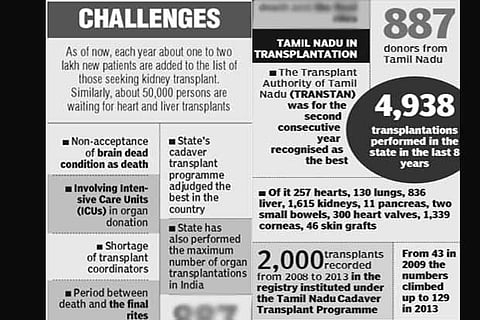

Chennai
Stating that over 50 to 60 per cent of the general population are willing to donate their organs, Dr Sunil Shroff of the Mohan Foundation, a not-for-profit government organisation, which promotes donations and transplantations, said, “Only half the number actually comes forward to register as a donor due to many reasons, one of which is the lack of knowledge on how to register.
The launch of the licence donor card will not only help in harvesting organs from victims of fatal road accidents, but it can be a way forward in making more people aware about the possibility of letting their organs live on.”
Dr Anna A, a nephrologist, said, “To reduce the demand-supply gap, we need intensified awareness campaigns. Just taking an oath for organ donation is not enough. People must pledge their organs and keep their families informed about their decision. Organ donation is altruistic, not a taboo.”
“Tamil Nadu has the title of ‘the state with the highest number of accidents’ to its name and in most of the cases, the organs are not donated. With the launch of the licence donor card, the number of donations will surely increase,” she added.
As of now, each year about one to two lakh new patients are added to the list of those seeking kidney transplant. Similarly, about 50,000 persons are waiting for heart and liver transplants. “The supply side has failed to keep up with the growing demand. The rate of transplant surgeries is not impressive. It is 7,500 for kidney, 1,500 for liver and merely 200 for heart. As against one lakh cornea requirements annually, we are able to get just 25,000,” said a government official.
Along with the move of approving the licence donor card, the government has also taken other steps to boost organ donation. It has signed an MoU with Spain, the world leader in organ donation, on cooperation in transplantation.
“Spain follows the presume consent, wherein the state presumes that the deceased had wanted to donate his/her organs. In India, we follow the explicit or informed consent. In the south, we already have quite an advanced programme.
The MoU with Spain may not have a great impact on our programmes here in the south. However, it may benefit those in the North, where they are struggling with donations,” said a nephrologist in the city.
Another major development in the sector has been the granting of licence to the national tissue bank to deal with donation, storage, distribution and transplantation of tissue like skin graft, corneas, bone and bone products, heart valves and vessels and cartilage.
Kin’s beliefs hinder organ donations
Known for his service to society and his willingness to help anyone in need, it is understood that 72-year-old Sriram from Mylapore would support organ donation. However, when his wife refused to give her consent for donation after his death – as it was not in their custom – it came as a great shock to all those who knew him well.
Religious views, lack of awareness and one’s belief in the many existing myths, are a few reasons why barely half the number of those interested in donation do so. Stating that there is no age limit for donation, a government official said, “Many refrain from registering for donation as they feel that they are too old to do so or too ill for their organs to be of use to others.
People should be made aware of the fact that anyone can donate and that an individual can save seven lives by it.” While almost 70 per cent of the public are comfortable with eye donation, barely 50 to 60 per cent agree to donate other organs.
“Of those willing to donate, only half of them pledge their organs. Also, if you are willing, you should inform your relatives, because after you die, they are the ones who take a decision whether to donate your organs or not. Therefore, we tell those who carry donor cards to inform their relatives,” said Dr Sunil Shroff of the Mohan Foundation.
“In our state, we see that the conversion rate among families is 65 per cent. If we counsel 10 families, 6.5 will say yes to donation. I think, in India, the problem is not with the families, but with hospitals. Sometimes systems are not geared up to receive the donations,” he added.
Stressing on the need for each hospital to have a trained counsellor to educate families of the deceased on the option of donation, Dr P Mohan, a health activist said, “One needs to be very sensitive while talking to a grieving family. The presence of a trained counsellor in all government as well as private hospitals is therefore the need of the hour.”
Visit news.dtnext.in to explore our interactive epaper!
Download the DT Next app for more exciting features!
Click here for iOS
Click here for Android